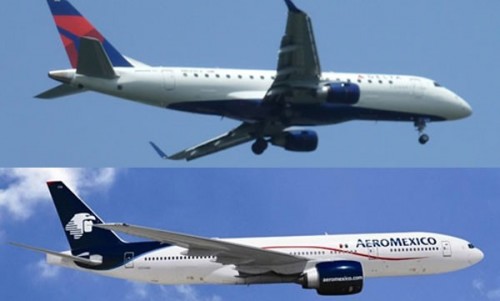On Friday, February 23, Delta Air Lines urged the U.S. government to allow the carrier to continue its partnership with Aeromexico, saying that otherwise, it would likely have to cancel nearly two dozen routes.
The U.S. Transportation Department (USDOT) said last month it had tentatively decided not to renew Delta’s antitrust immunity agreement covering its partnership at Aeromexico partnership, citing the Mexican government’s decision to make sweeping changes at the country’s main capital airport.
Delta said in a filing with USDOT that if the seven-year partnership is unwound, “nearly two dozen routes between the United States and Mexico would be at risk of cancellation,” and at least 10 other routes could see smaller airplanes and fewer seats.
Delta said fares would increase and “$800 million in annual consumer benefits would evaporate. A substantial number of jobs would be lost on both sides of the border.” The airline estimated 1.8 million roundtrip seats on transborder flights representing 4% total are at risk if the partnership is unwound.
USDOT did not immediately comment Friday but said last month the plan not to renew the partnership’s antitrust exemption is the result of changes made by Mexico.
Mexican officials moved cargo flights from Mexico City International Airport (AICM), the country’s busiest airport, to a newer airport ordered built by the president on the outskirts of town.
The actions are to the detriment of existing carriers and potential new entrants, according to USDOT, which has long been unhappy with slot allocations at the airport.
USDOT says the airlines tentatively have until Oct. 26 to wind down their joint venture.
Delta said USDOT’s “reasoning must be based on evidence — not uncorroborated assertions” and argued the government should offer a more detailed explanation “before executing a drastic, damaging, and unprecedented action.”
The immunity agreement allows the airlines to sell seats on each other’s flights under a codeshare arrangement. Delta and Aeromexico are set to offer more than 90 daily flights between the countries this year under the arrangement.
U.S. authorities and carriers have opposed the actions taken by the Mexican government, which President Andres Manuel Lopez Obrador has acknowledged are aimed at boosting low traffic at the new Felipe Angeles International Airport.
U.S. officials said last month they have spoken with high-ranking Mexican counterparts over the decisions, which USDOT called “fundamentally out of compliance with the existing bilateral air service agreement and international norms.”
TYT Newsroom


